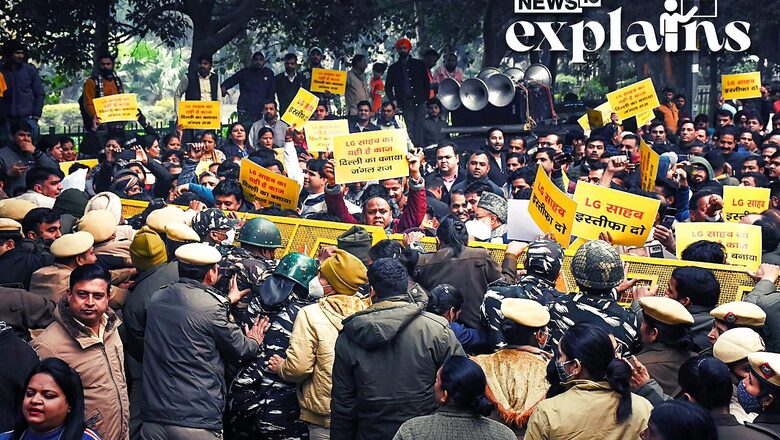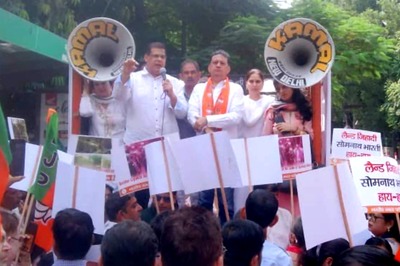
views
A 20-year-old woman was killed in the early hours of New Year after her scooter was hit by a car being driven by a group of men under the influence. They dragged her for 12 kilometres under the vehicle on the city’s roads, police said and added culpable homicide among other stringent sections on Monday in the case following protests.
What Happened in the Case?
Police said that the victim’s body was found naked on roadside in Kanjhawala area in outer Delhi and a medical board conducted a post-mortem on Monday, which will establish if she was sexually assaulted by the accused.
As outrage mounted over the incident, officials said that the Union Home Ministry has sought a detailed report from the Delhi Police on the direction of Home Minister Amit Shah.
The Delhi Police has also constituted an inquiry committee, headed by Special Commissioner Shalini Singh, and asked her to submit a probe report as early as possible, they said.
All five accused were sent to a three-day police custody on Monday.
Prima facie, it is suspected that the accused were intoxicated at the time of the incident. Sources said that blood samples have been sent for medical examination to ascertain if the accused were under the influence of alcohol. The report is awaited.
What Charges Have Accused Been Booked Under?
Addressing a press conference here, Special Commissioner of Police (Law and Order) Sagar Preet Hooda said fresh charges could be added against the five accused arrested in connection with the case on the basis of the post-mortem report.
The accused have been booked on charges of culpable homicide (Section 304) not amounting to murder, causing death by negligence and criminal conspiracy, according to the police.
According to Section 304 of IPC, whoever commits culpable homicide not amounting to murder shall be punished with imprisonment for life or imprisonment of either description for a term which may extend to ten years.
“The accused will be taken to the scene of the crime and their story will be verified. The timeline of events will be established on the basis of CCTV footage and digital evidence,” Hooda told reporters.
He said the victim’s family is being updated about the investigation and assured that the police will gather all evidence to ensure that the accused get the strictest punishment.
What is Intoxication?
Intoxication is a condition in which a person’s mental and physical state is ‘demonic’ as a result of drinking alcohol or using narcotics. It is commonly referred to as the intoxicated state. In this state of intoxication, the person is unable to determine whether what he or she is doing is correct or incorrect, and he or she is unable to comprehend the consequences of his or her actions. He is unable to control his actions and is unable to respond in a specific manner, a report by Legal Services India explains.
Alcohol intoxication is commonly defined legally as a blood alcohol concentration greater than 5.4-17.4 mmol/L.
IPC’s definition of intoxication
General exceptions, i.e. Chapter IV of the IPC, cover intoxication, the report states. A person is generally exempt from criminal liability for specific reasons such as intoxication, insanity, consent, and so on.
The accused bears the burden of proving the point of exception. Normally, the prosecution bears the burden of proof in order to convict the accused of a criminal offence. However, in this case, the accused must demonstrate why he should be exempt from criminal liability.
This is based on the idea that an innocent man should not be held accountable for an offence that is only guilty if proven. Sections 85 and 86 are concerned with the general exception of intoxication.
Section 85 of the Indian penal code states: “‘Act of a person who is unable to judge against his will for any reason of poisoning: nothing is an offence committed by a person who, at the time of the offence, is the result of poisoning, is unable to know the nature of the act, or who is doing the wrong thing or is in breach of the law, provided that the that what intoxicated him was administered to him without his knowledge or according to his will.”
This section covers offences where the person is involuntarily intoxicated, which means the intoxicating substance is administered against his will or the person has no knowledge of the intoxicating substances.
This implies that the substance was either forced upon him or that he was unaware that the substance given to him was intoxicating. The person should have been intoxicated at the time of the act or before committing the offence. He should not be aware of the consequences of his actions if they are illegal or against the law.
Section 86 of the Indian Penal Code: A drunken offender commits an offence that requires some intent or knowledge. In cases where the act is a criminal offence, a person who is intoxicated may be treated as if he had the same knowledge as he would have if he hadn’t been intoxicated, unless the thing that intoxicated him was administered to him without his knowledge or against his will.
In cases where the person is intoxicated but acts with specific knowledge or intent, he will be prosecuted for the same offence that he would have committed without the use of any intoxicating substance. Both knowledge and intention are considered important factors in this case, the report explains. If the person is capable of understanding what he has done, or if he has knowingly caused injury to another person, or if he is in his full senses, he will be prosecuted as a ‘normal person’.
Foreseeability Test
This test determines whether a person can be held liable for an offence. When a person consumes an intoxicating substance, he loses control of his actions. However, when a person voluntarily consumes alcohol, it indicates that he has been acting negligently and wishes to lose control. If he wanted to be in control, he could stop consuming if he knew that continuing to consume would result in a loss of control, and this clearly demonstrates a person’s intention. However, this is not the case in the case of involuntary intoxication, which is treated as a general defence under the IPC.
A person is not liable for an offence if he is unaware of the foreseeable events that will lead to the commission of the offence. If an intoxicated person commits murder and attempts to flee the scene as soon as the crime is committed, we can only conclude that person is able to walk properly and anticipates that he will be found guilty of murder and held liable for the crime.
With inputs from agencies
Read all the Latest Explainers here




















Comments
0 comment